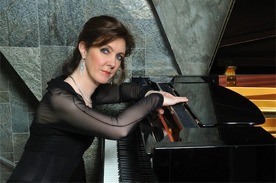 American pianist Anne-Marie McDermott.
American pianist Anne-Marie McDermott. And that’s a shame – because those who weren’t there missed out on pianist Anne-Marie McDermott (stepping in for Ingrid Fliter) in Haydn’s Piano Concerto in D Hob. XVIII No. 11. A Haydn concerto may seem an unlikely vehicle for and impressive debut (it was McDermott’s first appearance with the TSO), but her performance was one that I’ll remember as a highlight of the season.
For her encore, McDermott played the first movement of Bach’s English Suite No. 2. Here, her playing was both fluid and intense, marked by edgy “spikes” in the music’s textures. It would be a fine thing if the TSO could book her for a return engagement to call her own, when she isn’t filling in for someone else.
There was plenty more on the program: three substantial orchestral works.
Stravinsky’s Pulcinella – a clever re-working of music by Pergolesi – opened the concert, with Boreyko taking the opening movement at a rather restrained tempo. In fact, just about every movement seemed a little slow, which gave what ought to be a very lively score a plodding, pedestrian quality.
Britten’s Soireés musicales was also on the program (after the Haydn) – another example of a 20th-century composer mining the past for musical ideas. (In this case, it was songs by Rossini that served as source material.) Unfortunately, Britten’s efforts paled in comparison to Stravinsky’s, lacking the audacious stamp of personality that permeates every bar of Pulcinella. And it didn’t help that Boreyko’s approach was direct, often to the point of bluntness. The orchestra sounded uninspired under his baton.
To conclude, the program returned to Stravinsky for a substantial work: his Petrouchka (the 1947 suite). Now the TSO musicians displayed open love for the music on their stands – and it showed in a committed, colourful performance. Soloist after soloist shone in the spotlight, with top honours going to principal trumpeter Andrew McCandless.
Yet even here, Boreyko could have done more than he did. Although he controlled the orchestral balance well, he had a tendency to settle into tempos that were a little too comfortable and a little too steady. Why was he so risk-adverse?
© Colin Eatock 2014
 RSS Feed
RSS Feed

